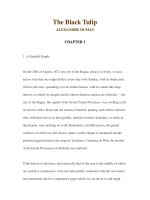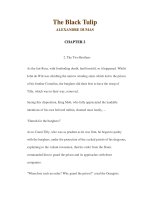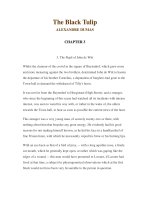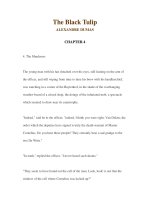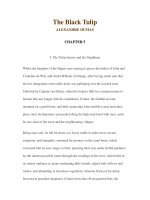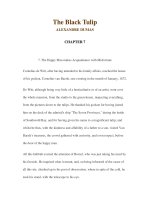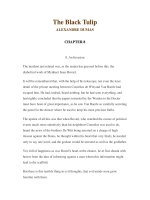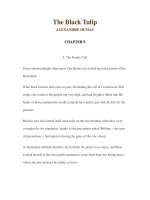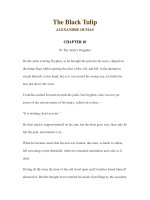LUYỆN ĐỌC TIẾNG ANH QUA CÁC TÁC PHẨM VĂN HỌC –The Black Tulip ALEXANDRE DUMAS CHAPTER 10 docx
Bạn đang xem bản rút gọn của tài liệu. Xem và tải ngay bản đầy đủ của tài liệu tại đây (19.79 KB, 9 trang )
The Black Tulip
ALEXANDRE DUMAS
CHAPTER 10
10. The Jailer's Daughter
On the same evening Gryphus, as he brought the prisoner his mess, slipped on
the damp flags whilst opening the door of the cell, and fell, in the attempt to
steady himself, on his hand; but as it was turned the wrong way, he broke his
arm just above the wrist.
Cornelius rushed forward towards the jailer, but Gryphus, who was not yet
aware of the serious nature of his injury, called out to him,
"It is nothing: don't you stir."
He then tried to support himself on his arm, but the bone gave way; then only he
felt the pain, and uttered a cry.
When he became aware that his arm was broken, this man, so harsh to others,
fell swooning on the threshold, where he remained motionless and cold, as if
dead.
During all this time the door of the cell stood open and Cornelius found himself
almost free. But the thought never entered his mind of profiting by this accident;
he had seen from the manner in which the arm was bent, and from the noise it
made in bending, that the bone was fractured, and that the patient must be in
great pain; and now he thought of nothing else but of administering relief to the
sufferer, however little benevolent the man had shown himself during their short
interview.
At the noise of Gryphus's fall, and at the cry which escaped him, a hasty step
was heard on the staircase, and immediately after a lovely apparition presented
itself to the eyes of Cornelius.
It was the beautiful young Frisian, who, seeing her father stretched on the
ground, and the prisoner bending over him, uttered a faint cry, as in the first
fright she thought Gryphus, whose brutality she well knew, had fallen in
consequence of a struggle between him and the prisoner.
Cornelius understood what was passing in the mind of the girl, at the very
moment when the suspicion arose in her heart.
But one moment told her the true state of the case and, ashamed of her first
thoughts, she cast her beautiful eyes, wet with tears, on the young man, and said
to him,
"I beg your pardon, and thank you, sir; the first for what I have thought, and the
second for what you are doing."
Cornelius blushed, and said, "I am but doing my duty as a Christian in helping
my neighbour."
"Yes, and affording him your help this evening, you have forgotten the abuse
which he heaped on you this morning. Oh, sir! this is more than humanity,
this is indeed Christian charity."
Cornelius cast his eyes on the beautiful girl, quite astonished to hear from the
mouth of one so humble such a noble and feeling speech.
But he had no time to express his surprise. Gryphus recovered from his swoon,
opened his eyes, and as his brutality was returning with his senses, he growled
"That's it, a fellow is in a hurry to bring to a prisoner his supper, and falls and
breaks his arm, and is left lying on the ground."
"Hush, my father," said Rosa, "you are unjust to this gentleman, whom I found
endeavouring to give you his aid."
"His aid?" Gryphus replied, with a doubtful air.
"It is quite true, master! I am quite ready to help you still more."
"You!" said Gryphus, "are you a medical man?"
"It was formerly my profession."
"And so you would be able to set my arm?"
"Perfectly."
"And what would you need to do it? let us hear."
"Two splinters of wood, and some linen for a bandage."
"Do you hear, Rosa?" said Gryphus, "the prisoner is going to set my arm, that's
a saving; come, assist me to get up, I feel as heavy as lead."
Rosa lent the sufferer her shoulder; he put his unhurt arm around her neck, and
making an effort, got on his legs, whilst Cornelius, to save him a walk, pushed a
chair towards him.
Gryphus sat down; then, turning towards his daughter, he said,
"Well, didn't you hear? go and fetch what is wanted."
Rosa went down, and immediately after returned with two staves of a small
barrel and a large roll of linen bandage.
Cornelius had made use of the intervening moments to take off the man's coat,
and to tuck up his shirt sleeve.
"Is this what you require, sir?" asked Rosa.
"Yes, mademoiselle," answered Cornelius, looking at the things she had
brought, "yes, that's right. Now push this table, whilst I support the arm of
your father."
Rosa pushed the table, Cornelius placed the broken arm on it so as to make it
flat, and with perfect skill set the bone, adjusted the splinters, and fastened the
bandages.
At the last touch, the jailer fainted a second time.
"Go and fetch vinegar, mademoiselle," said Cornelius; "we will bathe his
temples, and he will recover."
But, instead of acting up to the doctor's prescription, Rosa, after having satisfied
herself that her father was still unconscious, approached Cornelius and said,
"Service for service, sir."
"What do you mean, my pretty child?" said Cornelius.
"I mean to say, sir, that the judge who is to examine you to-morrow has inquired
to-day for the room in which you are confined, and, on being told that you are
occupying the cell of Mynheer Cornelius de Witt, laughed in a very strange and
very disagreeable manner, which makes me fear that no good awaits you."
"But," asked Cornelius, "what harm can they do to me?"
"Look at that gibbet."
"But I am not guilty," said Cornelius.
"Were they guilty whom you see down there gibbeted, mangled, and torn to
pieces?"
"That's true," said Cornelius, gravely.
"And besides," continued Rosa, "the people want to find you guilty. But
whether innocent or guilty, your trial begins to-morrow, and the day after you
will be condemned. Matters are settled very quickly in these times."
"Well, and what do you conclude from all this?"
"I conclude that I am alone, that I am weak, that my father is lying in a swoon,
that the dog is muzzled, and that consequently there is nothing to prevent your
making your escape. Fly, then; that's what I mean."
"What do you say?"
"I say that I was not able to save Mynheer Cornelius or Mynheer John de Witt,
and that I should like to save you. Only be quick; there, my father is regaining
his breath, one minute more, and he will open his eyes, and it will be too late.
Do you hesitate?"
In fact, Cornelius stood immovable, looking at Rosa, yet looking at her as if he
did not hear her.
"Don't you understand me?" said the young girl, with some impatience.
"Yes, I do," said Cornelius, "but "
"But?"
"I will not, they would accuse you."
"Never mind," said Rosa, blushing, "never mind that."
"You are very good, my dear child," replied Cornelius, "but I stay."
"You stay, oh, sir! oh, sir! don't you understand that you will be condemned to
death, executed on the scaffold, perhaps assassinated and torn to pieces, just like
Mynheer John and Mynheer Cornelius. For heaven's sake, don't think of me, but
fly from this place, Take care, it bears ill luck to the De Witts!"
"Halloa!" cried the jailer, recovering his senses, "who is talking of those rogues,
those wretches, those villains, the De Witts?"
"Don't be angry, my good man," said Cornelius, with his good-tempered smile,
"the worst thing for a fracture is excitement, by which the blood is heated."
Thereupon, he said in an undertone to Rosa
"My child, I am innocent, and I shall await my trial with tranquillity and an easy
mind."
"Hush," said Rosa.
"Why hush?"
"My father must not suppose that we have been talking to each other."
"What harm would that do?"
"What harm? He would never allow me to come here any more," said Rosa.
Cornelius received this innocent confidence with a smile; he felt as if a ray of
good fortune were shining on his path.
"Now, then, what are you chattering there together about?" said Gryphus, rising
and supporting his right arm with his left.
"Nothing," said Rosa; "the doctor is explaining to me what diet you are to
keep."
"Diet, diet for me? Well, my fine girl, I shall put you on diet too."
"On what diet, my father?"
"Never to go to the cells of the prisoners, and, if ever you should happen to go,
to leave them as soon as possible. Come, off with me, lead the way, and be
quick."
Rosa and Cornelius exchanged glances.
That of Rosa tried to express,
"There, you see?"
That of Cornelius said,
"Let it be as the Lord wills."
